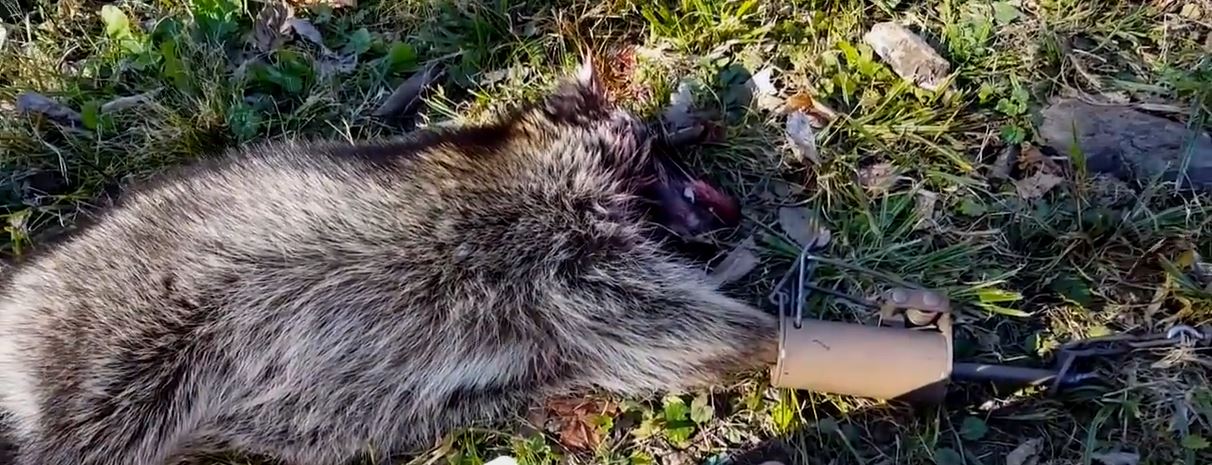How To Kill A Raccoon

When dealing with a raccoon on your property, it can be tempting to deal with it any way possible. If you have tried mild deterrents or taking away the raccoon's sources of food and shelter, then you may find yourself considering killing the animal. There are multiple methods of doing so, some of which are more humane than others. Before you truly consider killing a raccoon, be sure to look into your local regulations. Some areas may have restrictions on whether you can kill problem raccoons or even the methods or times of year you are allowed to do so. When it comes to potentially breaking the law, it is better to be safe than sorry.
Reasons To Avoid
Although killing may seem like the easy solution for your raccoon problem, it is actually one of the worst possible remedies. To begin with, killing a raccoon won't actually solve your problem. Yes, it will get rid of the raccoon that is currently causing problems on your property, but unless you make other changes, a new one will simply come and take its place.
Additionally, killing a raccoon is frequently considered inhumane. It has only chosen to take up residence on your property because we are slowly reducing their habitat, leaving them fewer options. If the animal in question is a mother and there are babies present, you will be effectively killing those babies as well. To make matters worse, if you don't find the babies and they die of starvation, you will have rotting raccoon carcasses somewhere on your property.
Lethal Traps
If you are set on killing the raccoon on your property, you may consider using a lethal trap. The most common type is the grip trap which relies on jaws and a trigger in a way similar to a mousetrap. The raccoon steps on the trap's trigger and then the jaws will catch the animal by its spine and neck. The raccoon should theoretically be killed instantly, but this is not true every time. If the raccoon is left injured in the trap, this would be considered an inhumane method. There is also an additional risk that an unsuspecting animal, such as the family dog or a neighborhood cat, will accidentally trigger the trap and be killed.
Poison
You will find multiple poisons that claim to kill raccoons. Anticoagulants are typically used to kill rodents and will cause internal bleeding as well as extreme pain for several days. Antifreeze causes excessive cellular and tissue damage and will take about 24 hours to kill the raccoon, during which it will be in pain. Other options include strychnine, Bromethalin, and Cholecalciferol, but poisons always carry a significant risk.
There is no way to ensure that the raccoon will find the poison and eat it, making your efforts for nothing. It is also possible that as with a lethal trap, another animal will find the poison and eat it. This means that unless you are careful, the poison you buy to kill a raccoon may end up killing your pooch. Not only that, but using poison is illegal in many areas. No poisons work immediately, so you will also have to deal with the poisoned raccoon crawling into a potentially remote area to die, leaving you to find and remove their carcass. Essentially, poison can be effective, but it is frequently illegal and almost always causes more trouble than it solves.
Live Trap Then Kill
Instead of using a lethal trap on the raccoon, you can also opt for a live one. Catching the animal makes it much easier to kill; many people consider drowning the trapped raccoon, but this is considered inhumane. The most humane methods for killing the animal after trapping it are carbon dioxide chambers and lethal injection, which are the options professionals will typically take.
Shooting Or Stabbing
Depending on where you live, it may be illegal to shoot the raccoon, but sometimes this will be an option. If it is not, and you are skilled with a knife, you may able to stab the raccoon to kill it. However, it is very unlikely that you will succeed, especially without getting bitten or scratched.
Disposing Of The Body
Even trying to get rid of the dead raccoon's body will be a challenge. There is always a risk of disease, meaning that you should not touch it. This risk of diseases also means that your garbage service may not take the body either. This will leave you with the choice of burning the body or burying it.
What To Do Instead
Killing a raccoon is not the ideal situation, leaving you with a choice among methods that may not work correctly or are inhumane. Luckily, there are plenty of other alternatives, such as preventative methods to encourage the raccoon to leave or prevent them from coming in the first place. You can also hire a professional to help you or use a live trap then relocate the animal. These options are more humane and don't leave you with a carcass to dispose of.
Read the How to get rid of raccoons page for helpful information and to learn more about How To Kill A Raccoon

